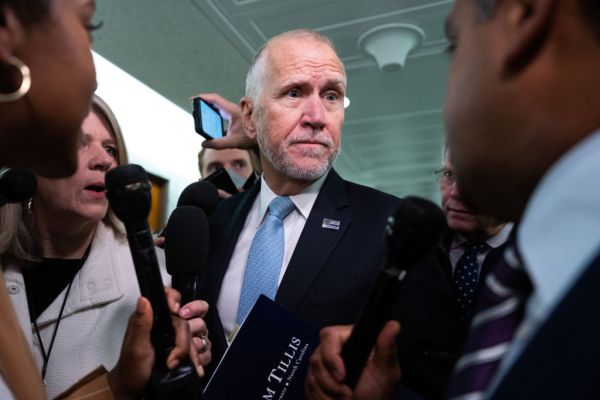Being the chair of the Congressional Progressive Caucus during a Republican trifecta is an unenviable position, but Rep. Greg Casar, a first-termer from Texas, sought it, facing no opposition in his bid to lead the group in the 119th Congress.
Although Republicans hold just a slim majority in the House of Representatives, the charismatic 35-year-old, who represents a district that includes parts of San Antonio and Austin, plans to take a patient approach to policy over the next two years. He’s betting that legislation from President-elect Donald Trump and Republicans will fail, leading voters to reward Democrats in upcoming elections.
“Trump isn't gonna be able to help himself,” Casar told The Dispatch. “He's gonna try to pass another billionaire tax break. He’s gonna betray the very working people he said he was gonna be for. And so I think this is a real chance for progressives to show that the Republicans are just total frauds on working people’s issues. And I think that’ll give us the opportunity to retake the House by huge margins and then put an actual progressive economic vision for the country forward.”
At a time when many pundits and elected officials are calling on Democrats to move to the center in the wake of a poor showing last month that gave Republicans control of the House, Senate, and White House, Casar and the other new leaders of the Progressive Caucus—deputy chair Rep. Ilhan Omar of Minnesota and whip Rep. Chuy Garcia of Illinois—are doubling down on their ideals. But the chances of any of their legislative priorities gaining traction are slim. None of the three had a bill enacted during the 118th Congress, when the GOP controlled only the House, and they are not promising to engage in the wheeling and dealing necessary to push through legislation in the new Congress.
Casar said he would be willing to vote for “good ideas” from Republicans and noted that the Progressive Caucus has worked across the aisle before on issues such as “privacy legislation and trying to block warrantless surveillance at the FBI.” But he wasn’t optimistic about Republican leaders advancing such bills or others he approved of.
“Mike Johnson and Donald Trump and his co-president, Elon Musk, don’t seem very interested in any policies that are for working class people,” said Casar, who is replacing Rep. Pramila Jayapal of Washington as caucus leader. “Their first priority sounds like a billionaire tax break, so I’m not getting my hopes up too much that they’re going to have any ideas other than awful and stupid and petty ones.”
Trump and his party have planned to roll back some of the legislation President Joe Biden signed into law that progressives are fond of, including some provisions of the Inflation Reduction Act. Omar, Casar’s deputy, said that maintaining their accomplishments from Biden’s administration is a possibility due to the tiny advantage Republicans have in the House.
“Our priorities also include us keeping the progress that we have made intact, and we know that there will be a path forward for that, as their majority is extremely slim, so we just have to hold the line and make sure our caucus is unified,” Omar, who served as the caucus whip in the 117th Congress and will begin her second term as deputy chair, told The Dispatch. She also pointed out that progressives put provisions into the Inflation Reduction Act and American Rescue Plan during Biden’s term and said “there might be opportunities for us to have some of our priorities in any big bills that get through.”
Garcia, the incoming whip, sounded the most hopeful that progressives could put in place their priorities during the Republican hegemony.
“We believe that our core values and the agenda that we put forward—the proposals in them— are wildly popular across partisan divides, so we’re going to fight hard to make sure people are aware of it,” he said. “And therein lies the hope and confidence that we can enact legislation that benefits working class people across the country on both sides of the aisle.”
In the ongoing debate about the factors that led to the Democrats losing ground among nearly every demographic group in the 2024 election, the caucus leadership is firmly of the belief that a more centrist positioning is not the answer. On the contrary, Casar says his party did not move leftward enough.
“If the Democratic Party was a little bit more like Chairwoman Jayapal and a little less like [West Virginia Sen.] Joe Manchin, I think we would have won this election,” he said at a press conference introducing the caucus’s new leadership. “I think we would have won this election because I hear pundit after pundit talking about how the Democratic Party should focus more on wages, housing, and childcare. Well, guess what? It was the Progressive Caucus that brought to the floor—over our own party’s opposition at times—wages, housing, and childcare.”
Casar also gave a progressive response to Republicans’ most effective attacks on Democrats this past cycle.
“The Progressive Caucus clearly says: It wasn’t a trans person who denied your health insurance claim. It was a giant health insurance company that has gone unregulated by the Republican majority,” he said during the December 5 press conference. “It was not an asylum seeker that raised your rent. It was a Wall Street hedge fund that did, just like the Wall Street hedge fund CEOs that Trump is trying to fill his cabinet up with.”
Beyond kitchen-table issues, Garcia diagnosed another contributing factor to the Democrats’ losses: Biden dropping out of the campaign in July and giving way to Vice President Kamala Harris so suddenly.
“I think there were a variety of circumstances that determined the outcome, including the president’s very late departure from the ballot, and that made it very difficult for Harris to perform better,” he told The Dispatch.
Many are familiar with the House’s “Squad,” the moniker Omar and Reps. Alexandria Ocasio-Cortez, Rashida Tlaib, and Ayanna Pressley adopted in 2019 to describe a new generation of progressive members and that expanded in subsequent elections. However, the Congressional Progressive Caucus, of which the aforementioned congresswomen are all members, predates that group. Then-Rep. Bernie Sanders and Rep. Maxine Waters founded it in 1991. Today, it boasts some 100 House members, generally representing deep-blue districts, as well as Sanders, the caucus’s only senator.
It remains to be seen how much sway the caucus will have in the Democratic Party under Casar’s leadership, but House Minority Leader Hakeem Jeffries signaled that it—and basically every other group in the party—would be listened to.
“I have great respect for members of the Congressional Progressive Caucus, the New Dems, the Blue Dogs, the Problem Solvers, Congressional Black Caucus, the Congressional Hispanic Caucus, the Asian and Pacific Islander Caucus, the Equality Caucus, and the Women’s Caucus,” Jeffries said at a press conference last week. “We, as House Democrats, authentically and most closely represent the hopes, the dreams, the aspirations, the fears, the concerns, the anxieties, the life experiences, and the passions of the American people, consistent with what the framers designed the House to be in our democracy. And it's my expectation that everyone's engagement will continue to be important. And my view of the House Democratic Caucus has been: Everybody matters.”







Please note that we at The Dispatch hold ourselves, our work, and our commenters to a higher standard than other places on the internet. We welcome comments that foster genuine debate or discussion—including comments critical of us or our work—but responses that include ad hominem attacks on fellow Dispatch members or are intended to stoke fear and anger may be moderated.
With your membership, you only have the ability to comment on The Morning Dispatch articles. Consider upgrading to join the conversation everywhere.